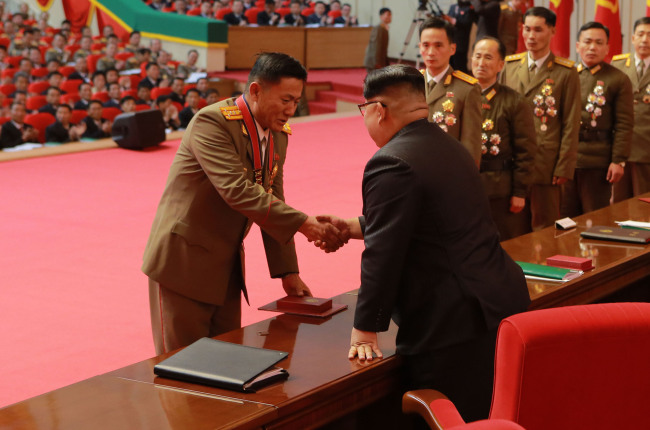Despite the US top diplomat’s attempt to seek direct talks without preconditions, North Korea is likely to proceed with its nuclear ambition, conducting another nuclear and missile test until they achieve “nuclear balance” with the US, a local security expert said Wednesday.
Cheong Seong-chang, senior fellow at Sejong Institute, said Pyongyang is likely to carry out the seventh nuclear test and another intercontinental ballistic missile test in 2018 as there is a “long way to go” for Pyongyang to reach the ultimate goal of acquiring nuclear weapons to strike the US mainland.
“There is no reasons for North Korea to begin talks now,“ said Cheong in a security forum hosted by Sejong Institute, a security think tank in Seoul. “In the foreseeable future, the prospect of direct talks amounts to zero.”

North Korean leader Kim Jong-un gives a speech in this undated photo released by the Korean Central News Agency (Yonhap)
On Tuesday in Washington, US State Secretary Rex Tillerson offered to begin direct talks with North Korea without preconditions, a proposal appeared to deviate from Washington’s previous stance that Pyongyang must first abandon its nuclear arsenal for any negotiations to take place.
While the latest launch of Hwasong-15 ICBM-class missile showed “technological progress,” Pyongyang still needs to show more advanced nuclear-strike capability against the US and they would detonate a hydrogen bomb over the Pacific next year to achieve the goal, Cheong said.
The airborne nuclear test over the Pacific would present a “serious test” to US President Donald Trump, who had said he would never tolerate North Korea’s capability to attack the US and pursue military options to prevent it, said David Straub, a former State Department diplomat.
Straub, who now works as a fellow at Sejong Institute, noted that the risk of using military force on the Korean Peninsula is “impossible to fathom,” but if Trump shows his reluctance on the military option, it would also raise doubts about the US role in the region.
“If the US uses its military force on the Korean Peninsula pre-emptively, it would bring a disastrous impact on the US stance in the region. But, then again, if Trump fails to make a decisive action, his leadership and the US role would be thrown into the question,” he wrote in his report.
Still, a pre-emptive strike on North Korea is a “far-fetched” idea as it could invite massive retaliation from the North and escalate into an all-out war on the peninsula, said Lee Sang-hyun, senior research fellow at Sejong Institute.
Regardless whether the pre-emptive attacks could become a “surgical strike” on nuclear and missile facilities or “multiple strikes” combined with cyberattacks, any military action runs the risk of causing another major conflict on the peninsula as North Korea is “risk-acceptant.”
“The likelihood of carrying out a pre-emptive strike can change depending on circumstances,” said Jin Chang-Soo, Director of Sejong Institute. “It depends upon what kinds of provocations North Korea would conduct and what sort of intention they have.”
By Yeo Jun-suk (jasonyeo@heraldcorp.com)






![[KH Explains] Hyundai's full hybrid edge to pay off amid slow transition to pure EVs](http://res.heraldm.com/phpwas/restmb_idxmake.php?idx=645&simg=/content/image/2024/04/18/20240418050645_0.jpg&u=20240419100350)